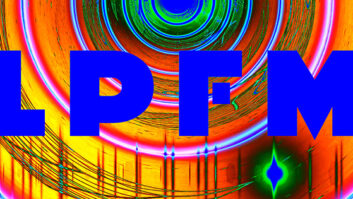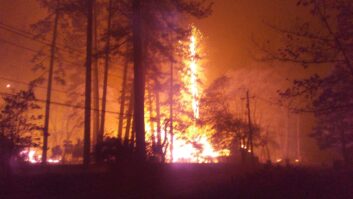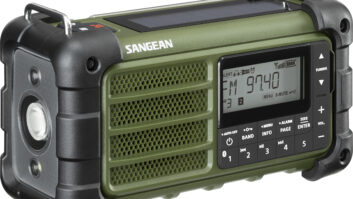
LONDON — The power of language and words became one of the themes of the annual “radio ideas” conference, Next Radio, which took place at London’s Royal Institution on Sept. 19.
Words replaced waveforms in a demonstration by Broadcast Bionics’ Managing Director Dan McQuillan of the firm’s new “object-based editing” tool. The technology records audio and transcribes it to text, and then users can edit audio and video from this text rather than a traditional waveform. The process is similar to cutting and pasting words in a document, and means audio can be searchable.

Broadcast Bionics Managing Director
Dan McQuillan (Photo: Next Radio)
McQuillan also revealed “multi-object recording,” which stores all the studio event data — such as fader moves and multi-track audio, allowing users to “unmix” a live program and remix it at a later point in the process. Object-based production could revolutionize audio workflows.
David Lloyd, author of “How To Make Great Radio,” put forward a compelling case that “whatever the future holds for this wonderful, exciting, changing medium of ours in the next 10 or 20 years, words will always matter.” He highlighted the strength of war reporting on radio compared to TV, saying “on radio, you can’t pixelate brutality — it’s the power of words,” and told those on the air: “Don’t just speak, say something.”

“Say something,” said David Lloyd during his
presentation at Next Radio. (Photo: Next Radio)
One week later on Sept. 26, the UK Radio Festival included a significant first speech from Britain’s new minister for Digital Matt Hancock. He announced that the trials of small-scale DAB, using freely-available software and equipment costing from £9,000 ($11,500), had been “highly successful and showed that the small scale approach to DAB transmission is technically sound.”
Ten trial muxes around the United Kingdom have allowed more than 100 small commercial and community stations to broadcast on DAB for the first time. U.K. broadcast regulator Ofcom has identified space in the airwaves that could support a U.K.-wide rollout, using spectrum bands previously occupied by business radio.
The Minister revealed that a light touch licensing and regulatory framework would now be put in place “at the earliest opportunity.” Ofcom says other European regulators have expressed interest in the new system, and DAB stations using the technology are already on air in Switzerland and France.
Videos of all the sessions from Next Radio 2016 are available on the website at nextrad.io.
Will Jackson reports on the industry for Radio World from London.












